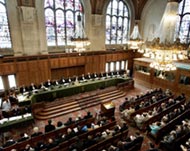Israel-EU relations take a nosedive
EU foreign policy chief Javier Solana met Israeli Foreign Minister Silvan Shalom and other officials in West Jerusalem on Thursday amid shrill Israeli criticism of the EU stand on the separation wall that Israel is building in the West Bank.

Israeli official sources said the government decided to give Solana “a difficult and cold reception” by cancelling scheduled meetings with some top Israeli officials.
Shalom and other Israeli officials have blasted the EU for voting in favour of a UN General Assembly resolution endorsing the recent ruling of the International Court of Justice (ICJ) declaring the separation wall illegal and calling for its demolition.
Shalom had issued a statement charging that European backing of the resolution amounted to “encouraging Palestinian terrorism”.
Israeli officials have also warned the EU that Europe would not be able to play a constructive role in advancing the Middle East peace process unless it adopted “a balanced position” on the issue of the barrier.
 |
|
EU maintains that the West Bank |
But Solana appeared unfazed by his hosts’ show of anger. “Like it or not, we are part of the peace process,” he said.
In Tel Aviv on Thursday, with Shalom by his side, Solana made no apologies for Europe’s independent policy. “I find myself challenged to convince the Israeli people that the European Union is a diplomatic partner we can trust,” he said.
“We will be involved whether you want us or not.”
Solana reiterated the EU position that the wall Israel is building is unacceptable.
Mixed signals
“Israel has the right to defend itself. None the less, Israel must honour international law. We respect the right of every country to construct a fence on its own territory, but a route through occupied territory is not compatible with international law,” the EU foreign policy chief said.
“We respect the right Javier Solana, |
Solana also contested the Israeli government’s claim that the present route of the separation barrier is justified because it “saved many lives”.
“I know that the fence has saved many lives, but it would also have saved these lives had it been built inside the pre-1967 armistice line … And it must be recalled that many Palestinians have died.”
But Solana gave no indication that the EU would consider imposing sanctions on Israel even if the Jewish state continued to ignore international opinion in light of the ruling by the UN’s top court.
A spokesman for the Dutch embassy in Tel Aviv refused to say if the EU foreign policy chief would press Israel to comply with The Hague-based World Court’s non-binding decision.
Holland is due to assume the rotating presidency of the European Union.
Growing dissent
Significantly, there is growing division within the Israeli political establishment over how to respond to the overwhelming opposition to the wall from the international community, expressed on Tuesday in New York when some 150 nation states endorsed the ICJ resolution.
The vote effectively rejected the Israeli explanation that the wall is a defensive barrier aimed at preventing Palestinian bombers, not at grabbing more Palestinian land for Jewish settlements.
The hardliners’ position is represented by Foreign Minister Shalom, who has stopped just short of accusing Europe of hating Israel.
 |
|
The World Court ruling on the wall |
Shalom has argued that the UN and the world community at large have no right to dictate to Israel what measures it can take to defend itself against what he considers “Palestinian terrorism against Israeli civilians” but which Palestinians see as resistance against Israeli occupation of their land.
By all accounts, Shalom’s “all are against us” view is shared by Prime Minister Ariel Sharon and the Israeli military establishment.
Sharon has already ordered the acceleration of construction of the wall in the northern and western West Bank.
The Israeli press reported earlier this week that several Arab villages and smaller towns southwest of Bethlehem would be ghettoised as a result of being “sandwiched” between the gigantic wall on the one side and the former armistice line between Israel proper and the West Bank on the other side.
If true, the ongoing work on the wall flies in the face of the Israeli supreme court’s recent decision ordering the government to strike a balance between the state’s “security needs” and the damage suffered by Palestinians.
The sceptics
The hardline view is being challenged by a growing number of Israelis, including some in government circles, who are urging a more balanced and less confrontationist approach to the ICJ ruling and international opposition to the barrier.
An important voice is that of opposition leader Shimon Peres, who has asked the Sharon government to “tone down” its criticism of both of the World Court and the EU.
Peres argues that brazen Israeli defiance of the international community would eventually convince some countries to “quietly boycott Israeli products”.
Going further, Justice Minister Yossi Lapid has cautioned that Israel risks being turned into an international pariah if it continues to ignore the ICJ ruling.
 |
|
Yossi Lapid (L) thinks Israel can |
On 10 July the Israeli newspaper Ha’aretz quoted him as saying that the ICJ and other international bodies act as a kind of global court that cannot be ignored.
Lapid said: “If we don’t respect human rights in the [Palestinian] territories, we’ll be putting ourselves in the situation in which South Africa found itself.”
Having said that, politicians such as Lapid and Peres should not expect their line of thinking to influence the present government’s policy, at least in the foreseeable future. For, their views constitute a minority opinion in a country where the powers that be, secure in the unquestioning support of the US, have routinely defied the will of the international community.
The US voted against the latest General Assembly resolution and is reported to have assured Israel that it would veto any draft resolution at the Security Council condemning Israel.